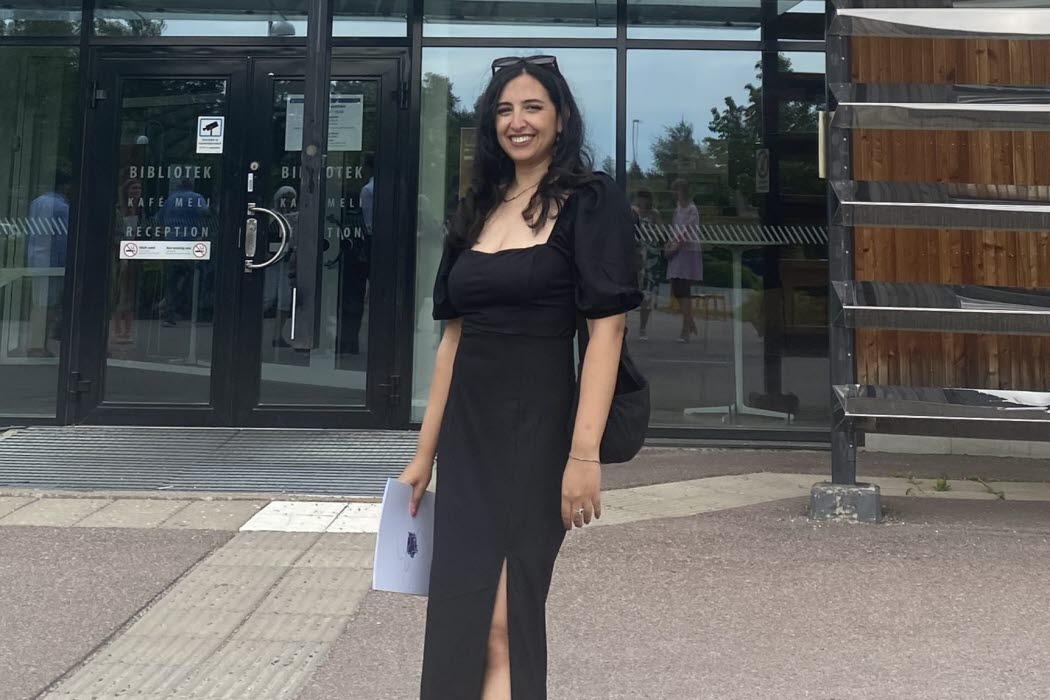2024: Clotilde Formica and Rozana Abd Alahad
Clotilde Formica
Thesis: Academic Air Travel: What Way Now? - Discourses on Academic Mobility among Early-Career Researchers and PhD Students in the Swedish Tourism Field.
 Italian-born Clotilde is an alumna of the Master’s degree programme in Tourism Destination Development at Dalarna University. In her thesis, she explores the culture of air travel in academia, focusing on the experiences of those at the lower levels of the hierarchy, such as early-career researchers (ECRs) and PhD students. Academic air travel is often considered essential for career progression and international collaboration, shaped by complex power dynamics and institutional expectations.
Italian-born Clotilde is an alumna of the Master’s degree programme in Tourism Destination Development at Dalarna University. In her thesis, she explores the culture of air travel in academia, focusing on the experiences of those at the lower levels of the hierarchy, such as early-career researchers (ECRs) and PhD students. Academic air travel is often considered essential for career progression and international collaboration, shaped by complex power dynamics and institutional expectations.
What inspired your research?
– The inspiration for this research stemmed from discussions during my programme in which mobility was a recurring topic. As I engaged with the literature and reflected on these discussions, I became passionate about investigating this issue, particularly from the perspective of ECRs and PhD students.
What were your findings?
– The findings reveal the hidden pressures and vulnerabilities stemming from the normalisation of hypermobility, exposing how this practice perpetuates divisions and fuels a taboo around addressing the topic. My thesis emphasises the need to rethink academic mobility and adopt sustainable practices. A balance between hypermobility and immobility is essential since reducing flights doesn’t mean stopping them entirely. My study calls for a holistic perspective, emphasising institutional and societal changes crucial for aligning scholars’ career ambitions with well-being and sustainability.
How would you like to see the results of your thesis used in the future?
– I hope that my work is published (fingers crossed) and that it inspires further discussion on academic mobility and sustainability. I also aim to explore the topic further through research to expand on the issues raised and advance the conversation.
How do you plan to use the scholarship?
– I plan to use the scholarship to present my work at a conference, which will help me gain visibility, build networks, and engage in discussions that could lead to further opportunities for collaboration and research.
What advice do you have for students starting their thesis work?
– My advice would be to choose a topic they are truly passionate about. The process requires a lot of patience and extensive reading, so it is very important to stay motivated. In my experience, choosing and refining the topic was the most challenging part of the project. I would also encourage students to be creative and think outside the box. Above all, enjoy the process, stay curious, and always maintain a hunger for knowledge.
Rozana Abd Alahad
Thesis: Revit som stöd för klimatkalkyler, en fallstudie baserad på ett parhus
 Rozana is an alumna of the Construction Engineeering Programme (Byggingenjörsprogrammet) at Dalarna University. In her thesis, she explores how the software Revit can be used to streamline climate calculations. Her work was not only awarded the title of Best Thesis in Sustainable Development but was also named the Best Thesis of 2024 at Dalarna University.
Rozana is an alumna of the Construction Engineeering Programme (Byggingenjörsprogrammet) at Dalarna University. In her thesis, she explores how the software Revit can be used to streamline climate calculations. Her work was not only awarded the title of Best Thesis in Sustainable Development but was also named the Best Thesis of 2024 at Dalarna University.
– I chose this topic because I am interested in how digitalisation and efficiency improvements can simplify and enhance the process of preparing climate declarations in the construction industry, Rozana explains.
What were your findings?
– My results showed that the use of Revit simplifies the process and reduces the time required to prepare climate calculations. However, climate calculations in Revit are not entirely complete and require supplementary calculations in Excel.
How do you hope the results of your study will be used in the future?
– I hope the findings of my study can contribute to improving and streamlining the climate calculation process in the construction industry. The use of Revit can provide a faster and more streamlined workflow, which can greatly benefit architects, engineers, and other professionals working with climate declarations. I believe companies in the construction sector, especially those focusing on sustainability and environmental certifications, can find significant value in the conclusions I have drawn.
How will you use the scholarship you received?
– I will use the scholarship to fund a trip to Texas, where I will participate in a short course or conference on sustainable development.
What are you doing today?
– I am currently working as a project engineer at the Swedish Transport Administration (Trafikverket), where I focus on climate reporting and monitoring the climate impact of various railway projects.
Do you have any advice for students about to start their thesis?
– My advice to other students starting their thesis is to carefully choose a topic that feels both interesting and relevant to their future career. A compelling subject makes the work both more enjoyable and rewarding.
2022: Andrea Čabajová and Jakub Košík
 Andrea and Jakub are students in the Master’s Programme in Business Studies with an International Focus at Dalarna University. In their thesis, Andrea and Jakub examined the sustainable aesthetics of packaging material according to customer preferences in Slovakia, which is a low environmental-performance-index (EPI) country in the European Union.
Andrea and Jakub are students in the Master’s Programme in Business Studies with an International Focus at Dalarna University. In their thesis, Andrea and Jakub examined the sustainable aesthetics of packaging material according to customer preferences in Slovakia, which is a low environmental-performance-index (EPI) country in the European Union.
– Society is currently facing many environmental problems, one of which is the issue of plastic packaging that is manufactured every day in massive amounts. Because of this, we wanted to come up with more creative ideas about how to package products. Our focus was on recycled paper as this material does not burden nature in the same way that other more frequently used materials do. However, the problem with this material is that it is seldom visually appealing to consumers, which is why we wanted to make it attractive. Our results provide guidelines for making this material more appealing using graphic, structural and information elements.
How would you like to see the results of your thesis used in the future? Who do you think can benefit from the conclusions you arrived at?
– We truly hope that our thesis will bring about more discussion on the issue of plastics and that businesses will take steps to limit their usage. With our thesis, we want to address graphic designers, entrepreneurs as well as business leaders, and we aim to inspire firms to develop and use innovative and sustainable packaging that contributes to a sustainable future.
How will you use the scholarship?
– We would like to use the scholarship to attend an environmental conference related to sustainable packaging and its future so that we can acquire more information and knowledge in this area. We also believe this to be an opportunity that can help us meet new people who have the same interests and who want to contribute to a better future just as we do.
Deciding on the winning entry was a jury made up of members from Dalarna University’s Sustainable Development Council. The reason for their decision was based on the following:
"Andrea Čabajová and Jakub Košík’s thesis studies the sustainable aesthetics of packaging material according to customer preferences in Slovakia, which is a low environmental-performance-index (EPI) country in the European Union. Along with the unique knowledge contribution to research on sustainable development, their results have the potential to positively influence businesses transitioning to a more sustainable product and, in a secondary sense, within a sustainable supply chain. The research also offers several benefits to society, but perhaps the major benefits are in the contribution of the study to attractiveness in relation to recycled-product packaging and the provision of accurate and appealing sustainability information to the consumer."
2020: Anastasiia An
Thesis: Early Design Stage Energy Optimization of Bysjöstrand Ecovillage, Sweden (DiVA)
A graduate of Dalarna University’s Master’s Programme in Energy Efficient Built Environment, Anastasiia based her thesis on her research on how energy performance can be improved in a newly designed residential area. The focus of her study was the village of Bysjöstrand, a so-called EcoVillage, which is under construction just south of the town of Grangärde, not far from Ludvika.
Her thesis describes the combination of various types of analysis and technology to achieve the lowest possible energy demand. The buildings’ siting, their orientation, their window-to-wall ratios and the buildings' insulation thickness were among some of the factors she considered, as well as the solar energy potential of each building. Overall, the study shows that the total annual energy consumption in the EcoVillage can be reduced by as much as 50 percent.
– I believe that decisions made at the early stage of building or settlement design can greatly influence the energy performance of the built environment. Moreover, the benefits of reducing the energy consumption can be maximised by using renewable energy sources, explains Anastasiia. She adds that the proposed methods for energy optimisation are supported by economic calculations that show investment in such methods to be cost-effective.
How would you like to see the results of your thesis used in the future? Who do you think can make use of the conclusions you arrived at?
– I consider my study to be useful for anyone interested in sustainable development and involved in the energy performance optimisation of buildings. With my thesis work, I want to contribute to the high sustainability ambitions of architects and engineers, so they can integrate energy assessment and building optimisation activities into the planning process at the early design stages. According to the results of my work, I believe that the strategic decisions combined with energy-efficient design and onsite renewable energy production are the most widely recognised ways in which a building or a neighbourhood design can contribute to a more sustainable community with a smaller carbon footprint, states Anastasiia.
Deciding on the winning entry was a jury made up of three members from Dalarna University’s Council for Sustainable Development. They motivated their decision as follows:
"Energy is incredibly central to a transition to sustainability. In just a few decades, all of society needs to be fossil-free, and this can be achieved both through the supply of more renewable energy as well as through the smarter use of the energy that is supplied. Anastasiia An combines these two approaches when she addresses the possibility of trying to optimise energy performance in a residential area in the early planning phase. The combination of analyses that were conducted in the study shows great potential energy saving. Her approach is applicable in other construction contexts as well: therefore, its potential benefit for society is great. Anastasiia's work was carried out in a systematic fashion, and besides demonstrating academic preciseness, her thesis is pedagogical and as such comprehensible even to those who are not themselves in the construction or energy industry."
2019: Ilenia Tonetti
2018: Pavlina Arsova
Thesis: Alcohol Advertising: A Minor Field Study in Cape Town (DiVA)